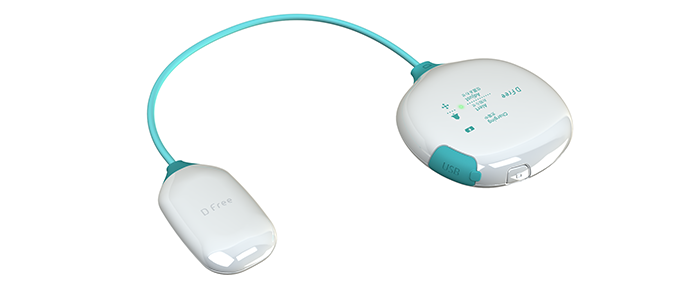Triple W Japan Brings the Dfree, an Industry-Leading Healthcare Product, to CES 2018
Jan 04, 2018

The Tokyo-based startup Triple W Japan will make its U.S. debut at CES 2018 in Las Vegas, Nevada. The company will showcase DFree, a non-invasive ultrasound device that tracks bladder fullness to help people with incontinence avoid accidents.
Founded in February 2015, Triple W Japan reflects the vision of President and CEO Atsushi Nakanishi, who created DFree after realizing incontinence, or the lack of control over one’s bladder, robbed elderly people, the physically disabled, and anyone unable to go to the bathroom without assistance, of their dignity. “DFree is meant to help people regain and keep their human dignity,” said Rui Yamamato, Triple W Japan’s Office Manager, in an interview.
DFree is a lightweight, wearable sensor that tracks bladder fullness and then sends the data to an app, where a user can observe their bladder patterns. DFree not only allows users to understand their bathroom habits, but it also lets them to anticipate and plan around their need to go. As a result, users no longer have to worry about accidents and can often forgo the embarrassment of wearing diapers.
DFree’s benefits are more than just physical; the device also provides users with a sense of control and freedom over their lives. In one case, there was a large elderly man who wasn’t able to use the bathroom independently after suffering a stroke. For every bathroom visit, he needed two attendants to get him there. Because the nursing home didn’t always have enough labor on hand, the patient had to wear a diaper when no assistance was available. The man, who had been a well-respected senior manager in his company prior to his stroke, was embarassed and depressed by his situation. After switching to DFree, the nursing home was able to schedule attendants in advance to take him to the bathroom when his bladder was full. As a result, the man was able to wear fewer diapers and plan his day around bathroom visits. The man was overjoyed. “He felt like an adult again, someone who could have control over himself,” said Yamamoto.
For many nursing homes, this kind of device offers the opportunity to be more efficient with patient care. For nursing homes in Japan, more than a quarter of a caretaker’s time is devoted to toilet care, or taking a patient to a bathroom and waiting for them to go. Traditionally, this process features a lot of guesswork and waiting. DFree eliminates this uncertainty and allows nurses to schedule toilet times in advance, freeing up much of their time towards other care activities.
DFree’s ability to anticipate users’ restroom needs sets it apart from other similar ultrasound devices, which track urine in the bladder but do not make predictions based on the information.
DFree is available to elder-care facilities in Japan, and is currently used by SOMPO Care Group, one of Japan’s largest nursing home companies. DFree will go on sale for individual consumers in 2018. It’s expected to be a boon for health home aids and relatives caring for elderly invalids.
Although DFree is not currently available in North America, Triple W Japan expects to eventually introduce it to the U.S. market. The company is currently exploring new partnership opportunities with U.S. health insurance groups and medical device representative groups, as well as collaborative opportunities with other U.S. healthcare startups.
For complete info on Triple W Japan and the DFree, visit: http://DFree.biz/company-en/





